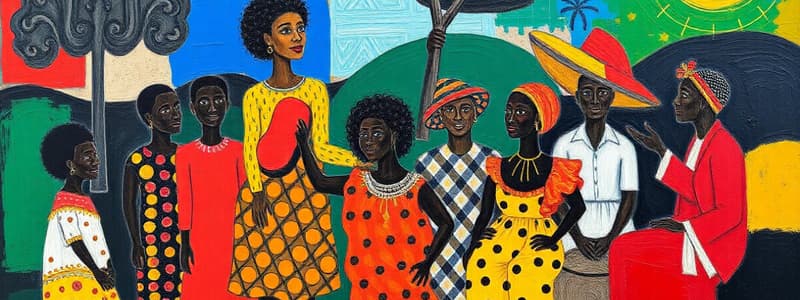Podcast
Questions and Answers
What does political ecology primarily examine in the context of development?
What does political ecology primarily examine in the context of development?
- The historical migrations of various African communities.
- The natural resources available in a region.
- The relations of power and dominance in development decisions. (correct)
- The impact of environmental changes on development outcomes.
Which of the following has been a result of rediscovering indigenous knowledge in African communities?
Which of the following has been a result of rediscovering indigenous knowledge in African communities?
- Complete abandonment of any past practices.
- Increased reliance on modern technologies.
- Attainment of international development funding.
- Greater self-reliance and confidence in local capacities. (correct)
The Maitatsine movement and Boko Haram illustrate what aspect of modern development in Nigeria?
The Maitatsine movement and Boko Haram illustrate what aspect of modern development in Nigeria?
- The promotion of governmental control over local resources.
- Rejection of Western modernity in favor of traditional values. (correct)
- The acceptance of Western education as beneficial.
- The combination of technology and traditional practices.
How did colonial policies influence perceptions of Africa’s development potential?
How did colonial policies influence perceptions of Africa’s development potential?
Which key event contributed to the modern discourse on development in the twentieth century?
Which key event contributed to the modern discourse on development in the twentieth century?
What is one reason why development efforts in Africa have faced criticism?
What is one reason why development efforts in Africa have faced criticism?
The assumption that Africa has a limited potential for development is linked to which of the following theories?
The assumption that Africa has a limited potential for development is linked to which of the following theories?
Which statement best describes the investments made during the colonial period in Africa?
Which statement best describes the investments made during the colonial period in Africa?
Which phrase captures the essence of the prevailing perception of Africa in the 18th century?
Which phrase captures the essence of the prevailing perception of Africa in the 18th century?
What was a common characteristic of most landlocked states in Africa after colonialism?
What was a common characteristic of most landlocked states in Africa after colonialism?
Why is the phrase 'Africa is not a country' significant in contemporary discourse?
Why is the phrase 'Africa is not a country' significant in contemporary discourse?
Which of the following features prominently in the perception of Africa in Western society?
Which of the following features prominently in the perception of Africa in Western society?
What aspect of tourism in Africa has often faltered in accurately representing the continent?
What aspect of tourism in Africa has often faltered in accurately representing the continent?
What challenge does the concept of 'unlearning' present in the study of Africa?
What challenge does the concept of 'unlearning' present in the study of Africa?
The 'traveller’s gaze' in the context of tourism reflects what about perceptions of African culture?
The 'traveller’s gaze' in the context of tourism reflects what about perceptions of African culture?
Which statement about contemporary political maps of Africa is accurate?
Which statement about contemporary political maps of Africa is accurate?
What term refers to the regions in Africa where significant agricultural innovations took place independently?
What term refers to the regions in Africa where significant agricultural innovations took place independently?
Which of the following plants was NOT domesticated in Africa during the Agricultural Revolution?
Which of the following plants was NOT domesticated in Africa during the Agricultural Revolution?
The Bantu migrations contributed primarily to the spread of which of the following aspects in sub-Saharan Africa?
The Bantu migrations contributed primarily to the spread of which of the following aspects in sub-Saharan Africa?
What factors led to the collapse of the Kush Empire around A.D. 300?
What factors led to the collapse of the Kush Empire around A.D. 300?
Which ancient state was located in the Nile Valley and gained independence from Egypt around 1000 B.C.?
Which ancient state was located in the Nile Valley and gained independence from Egypt around 1000 B.C.?
What was a significant feature of the Axum civilization that emerged in the 1st century A.D.?
What was a significant feature of the Axum civilization that emerged in the 1st century A.D.?
How did the Bantu migrations affect the political dynamics of the regions they moved into?
How did the Bantu migrations affect the political dynamics of the regions they moved into?
Which of the following best describes the impact of modern development on local communities in Africa?
Which of the following best describes the impact of modern development on local communities in Africa?
Flashcards
Colonial Development Assumptions
Colonial Development Assumptions
Colonial policies viewed Africa's development potential as limited. Early assumptions prioritized the interests of colonizers and often underestimated African capabilities.
Environmental Determinism
Environmental Determinism
The belief that environmental factors (climate, ecology, soil) directly influence a region's development levels, often negatively.
1947 Truman Speech
1947 Truman Speech
A pivotal moment in development discourse, marking the beginning of an intense focus on global development by the U.S.
Political Ecology
Political Ecology
Signup and view all the flashcards
Anti-Development Movements
Anti-Development Movements
Signup and view all the flashcards
Boiko Haram
Boiko Haram
Signup and view all the flashcards
Development Failures
Development Failures
Signup and view all the flashcards
Modern Development
Modern Development
Signup and view all the flashcards
Africa's perceived image
Africa's perceived image
Signup and view all the flashcards
Colonial legacy
Colonial legacy
Signup and view all the flashcards
Political map changes
Political map changes
Signup and view all the flashcards
Regional groupings
Regional groupings
Signup and view all the flashcards
Safari tourism
Safari tourism
Signup and view all the flashcards
Western perceptions
Western perceptions
Signup and view all the flashcards
Landlocked states
Landlocked states
Signup and view all the flashcards
"The darkest continent"
"The darkest continent"
Signup and view all the flashcards
Cradle of Humanity
Cradle of Humanity
Signup and view all the flashcards
Agricultural Revolution in Africa
Agricultural Revolution in Africa
Signup and view all the flashcards
Bantu Migrations
Bantu Migrations
Signup and view all the flashcards
Kush Empire
Kush Empire
Signup and view all the flashcards
Axum
Axum
Signup and view all the flashcards
Domesticated Crops in Africa
Domesticated Crops in Africa
Signup and view all the flashcards
Nile River's Role
Nile River's Role
Signup and view all the flashcards
Collapse of Kush
Collapse of Kush
Signup and view all the flashcards
Study Notes
Historical Perceptions of Africa
- Early 18th-century maps depicted Africa with stereotypical images, filling gaps with animals instead of populated areas.
- Jonathan Swift's quote highlights this visualization: "So geographers in Afric maps / With savage pictures fill their gaps, / And o'er uninhabitable downs / Place elephants for want of towns."
- 18th-century perceptions viewed Africa as a "darkest continent," lacking detailed understanding.
- 1807 Arrowsmith map continued this trend.
- Today, Africa is recognized as a considerably larger continent than generally perceived.
- Modern maps reveal more comprehensive and accurate political landscapes.
- The continent holds vast diversity in cultures, languages, and political systems, despite common misconceptions.
Colonial Narratives
- Colonial policies regarding Africa before the 1940s were influenced by assumptions of limited development potential.
- Environmental determinism (linking development to the environment) was a prominent factor.
- Theories based on racial categories influenced development policies, prioritizing colonizer interests.
- No unified vision for African development emerged during this period.
- Such policies often disregarded or misrepresented local knowledge and resources.
National Geographic and Tourism
- National Geographic has historically played a significant role in shaping Western perceptions of Africa.
- Images often focus on wildlife safaris instead of broader human society.
- The portrayal of Africa often perpetuates stereotypes and a "tragic continent" narrative, minimizing progress and successful stories.
Imagining Africa
- Deeply embedded ideas about Africa in Western society influence perceptions and understanding.
- These ideas often stem from colonial-era assumptions and stereotypes.
- This is not new; ideas about Africa have persisted and influenced perspectives for decades.
- Overcoming these stereotypes requires conscious effort.
Development in Africa
- The modern concept of development emerged in the mid-20th century speech by Truman.
- A significant expansion of development initiatives followed.
- Challenges to effective development efforts include questions of underlying assumptions about Africa's potential.
African Empires
- African empires, such as Kush, Axum, Ghana, Mali, and Songhai, existed for centuries before colonialism.
- The empires engaged in sophisticated governance, trade, agricultural systems, and cultural exchange.
- Interactions with other regions were often significant and involved trade as well as conflict
- Evidence of ancient civilizations in Africa exists and were influenced by the environment but were not determined by it.
Bantu Migrations
- Bantu migrations involved the movement of Bantu-speaking people across large parts of Sub-Saharan Africa.
- The migrations involved the spread of languages, ideas and technologies.
- These developments had a large effect on the social landscape.
- The process took 2000 BCE to about 1200 CE; reaching southern Africa.
- 2000 years of language development and trade throughout the region.
- These communities developed sophisticated systems for agriculture, trade, and governance.
African History
- Available archaeological, linguistic and genetic evidence portrays Africa as the cradle of humanity.
- Agricultural innovations arose independently in various regions across the continent.
- Domesticated plants such as Cereals, tubers, pulses, oil crops, and vegetables were cultivated.
- These developments supported and enriched diverse social systems.
Hollywood and the Media
- Hollywood films often portray Africa in stereotypical and problematic ways, focusing on violence or chaos, rather than success stories.
- Media representations can contribute to harmful stereotypes.
- Western media often neglect or trivialize examples of progress and success in Africa.
Political Impacts
- Political ecology in development decisions regarding resources and its impact on local communities.
- Understanding who holds power and how it impacts resource allocation.
Studying That Suits You
Use AI to generate personalized quizzes and flashcards to suit your learning preferences.




